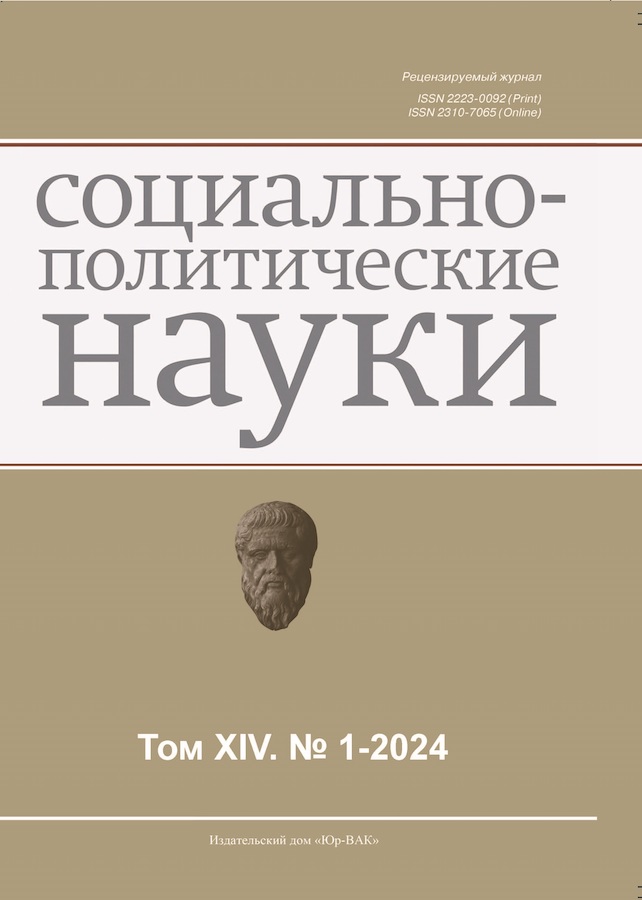Family policy as the basis for preserving and ensuring values in the Russian Federation
- 作者: Letova N.V.1
-
隶属关系:
- Institute of State and Law of the Russian Academy of Sciences
- 期: 卷 14, 编号 1 (2024)
- 页面: 58-66
- 栏目: Public Administration and Sectoral Policies
- URL: https://journals.eco-vector.com/2223-0092/article/view/630540
- DOI: https://doi.org/10.33693/2223-0092-2024-14-1-58-66
- EDN: https://elibrary.ru/CJJRXU
- ID: 630540
如何引用文章
详细
Purpose of the study. The article identifies trends in the development of state family policy, the key direction of which is the comprehensive protection of the institution of the family, based on traditional family values, providing conditions for the birth and raising of children, the popularization of large families for the purpose of saving people and improving the demographic situation in Russia. It has been determined that the implementation of multi-sectoral support measures for families with children provides the necessary conditions to meet their basic needs; it has been proven that preferences in the field of labor and pensions for women with many children will provide them with conditions for them to fully combine work responsibilities with family responsibilities. It is concluded that the state’s family policy is focused on ensuring the protection and protection of traditional family values that determine the essence of family relationships and the prospects for their further development.
全文:
作者简介
Natalia Letova
Institute of State and Law of the Russian Academy of Sciences
编辑信件的主要联系方式.
Email: letovanv@mail.ru
ORCID iD: 0000-0001-7033-977X
Dr. Sci. (Law); Chief Researcher, Procedural Law Sector
俄罗斯联邦, Moscow参考
- Maltsev G.V. Moral foundations of law. 2nd ed. Moscow: Norma; INFRA-M. 2019.
- Khabrieva T.Ya. The theory of modern fundamental law and the Russian Constitution. Journal of Russian Law. 2008. 2008. No. 12. Pp. 12–18. (In Rus.)
- Zorkin V.D. Law against chaos: Monograph. 2nd ed., rev. and additional. Moscow, 2018.
- Trusov N.A. On improving the regulation of certain issues of the organization of public power: A critical look at certain issues of technology and content of the draft law of the Russian Federation on an amendment to the Constitution of the Russian Federation. State Power and Local Self-government. 2020. No. 4. Pp. 13–18. (In Rus.)
- Letova N.V. Motherhood and childhood as the basis of family policy: Modernity and historical heritage. State and Law. 2023. No. 3. Pp. 120–127. (In Rus.)
- Chucha S.Yu. Constitutionalization and expansion of the legal content of the concept of social partnership in the Russian Federation. Law Enforcement. 2021. Vol. 5. No. 3. Pp. 249–261. (In Rus.)
- Khabrieva T.Ya. Constitutional reform in Russia: In search of national identity. Bulletin of the Russian Academy of Sciences. 2020. Vol. 90. No. 5. Pp. 24–33. (In Rus.)
- Letova N.V. Maternity capital as a type of social support for families with children: Problems of law enforcement and solutions. State and Law. 2022. No. 5. Pp. 96–103. (In Rus.)
- Astapova T.Yu. Traditional family values as a direction for improving family legislation // Family and Housing Law. 2023. No. 3. Pp. 2–4. (In Rus.)
- Maslennikova S.V., Matveeva M.V. Traditional family values: Constitutional and legal interpretation. Constitutional and Municipal Law. 2020. No. 12. Pp. 23–29. (In Rus.)
- Muravyova M. Traditional values and modern families: Legal approaches to tradition and modernity in modern Russia. Journal of Social Policy Research. 2014. Vol. 12. No. 4. Pp. 632–633. (In Rus.)
- Bespalov Yu.F. On the issue of family values in the Russian Federation. Family and Housing Law. 2018. No. 5. Pp. 25–30. (In Rus.)
- Violence as a negative social phenomenon: legal means of counteraction: Monograph. N.V. Letova (rep. ed.). Moscow: Prospekt, 2023. 280 p.
- Chirkov S.A. Development of the demographic function in pension law, or New early insurance pensions for mothers of many children. SPS ConsultantPlus. 2019. (In Rus.)
- Samsonova V.O. Pension provision for families raising a disabled child: Russian and foreign experience of legal regulation. Social and Pension Law. 2017. No. 3. Pp. 39–43. (In Rus.)
- Boldyrev O.Yu. Social state: How to bring reality closer to the constitutional principle. Constitutional and Municipal Law. 2020. No. 2. Pp. 11–16. (In Rus.)
- Pashentseva S.V. Stages of development of gender equality in Russia. Law and Politics. 2007. No. 12. Pp. 107–112. (In Rus.)
- Chkhutiashvili L.V. Main directions of implementation of the new family policy of the state. Current Problems of Russian Law. 2017. No. 5. Pp. 46–49. (In Rus.)
- Starodubova U.M., Igolnikova V.A. Labor guarantees for employees when providing maternity leave. Alley of Science. 2018. Vol. 6. No. 10 (26). Pp. 810–814. (In Rus.)
- Matveeva T.P., Kuznetsova N.A., Pavlovskaya Yu.V. Comparative legal analysis of the system of social support for motherhood and childhood in Russia and abroad. Questions of Russian and International Law. 2018. Vol. 8. No. 12A. Pp. 65–73. (In Rus.)
- Chingisbaeva A.E. Labor rights of pregnant women and young mothers. Bulletin of the Institute of Legislation and Legal Information of the Republic of Kazakhstan. 2020. No. S1 (59). Pp. 164–169. (In Rus.)
- Pishnyak A.I., Nadezhdina E.V. Employment of Russian women after the birth of children: Incentives and barriers. Journal of Social Policy Research. 2020. Vol. 18. No. 2. Pp. 221–238. (In Rus.)
- Kostenko E.P., Kuznetsova S.Yu. Tools for overcoming gender inequality in the workplace: The experience of France. Journal of Economic Regulation. 2019. Vol. 10. No. 4. Pp. 103–116. (In Rus.)
- Falyakhov R. Poverty in Russia: Tens of millions below the line. Gazeta.ru. URL: https://www.gazeta.ru/business/ 2018/05/09/11745109.shtml
- Davydova N.M. Deprivation approach to poverty assessments. Sociological Research. 2003. No. 6. URL: http://ecsocman.hse.ru/socis/msg/205329.html
补充文件








